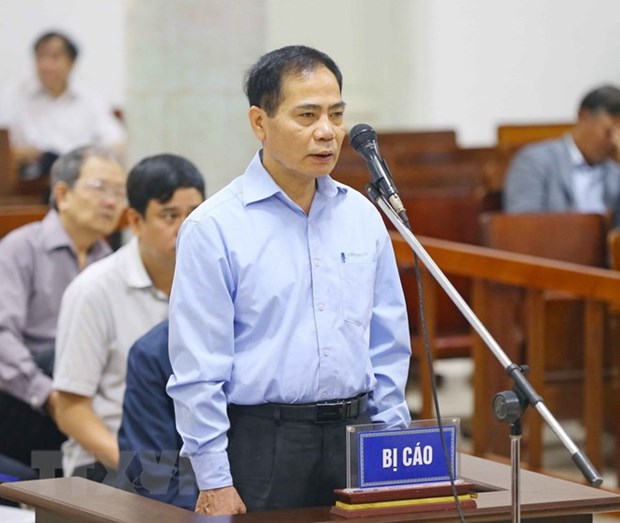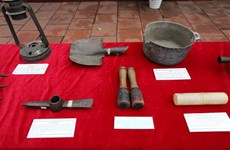Nine defendants involved in Da River pipeline ruptures stand trial
The Hanoi People’s Court opened on March 5 the first-instance trial for nine defendants accused of being responsible for the 18 successive ruptures of the Da River water pipelines in the capital city.
 Hoang The Trung, former Director of the management board of the Da River water supply system investment and construction project, at the trial (Source: VNA)
Hoang The Trung, former Director of the management board of the Da River water supply system investment and construction project, at the trial (Source: VNA) Hanoi (VNA) – The Hanoi People’s Court opened on March 5 the
first-instance trial for nine defendants accused of being responsible for the
18 successive ruptures of the Da River water pipelines in the capital city.
The defendants include Hoang The Trung (former Director of the management board of the Da River water supply system investment and construction project), Nguyen Van Khai (former Deputy Director of the management board), and Truong Tran Hien (former head of the materials and equipment division of the management board).
Also on trial are Tran Cao Bang (former Director of the Vinaconex Glass Fiber Reinforced Polyester Pipe JSC) and Vu Thanh Hai (former head of the production division, former workshop foreman, and former Deputy Director of the Vinaconex Glass Fiber Reinforced Polyester Pipe JSC).
The other defendants are Do Dinh Tri (former official of the Vietnam Water, Sanitation and Environment JSC (VIWASE) under the Ministry of Construction, and former chief of the consultant and monitoring team at the Da River water supply project), Nguyen Bien Hung (former official of VIWASE, former deputy head of the consultant and monitoring team), Hoang Quoc Thong (former official of VIWASE, former overseer at the Da River water supply project), and Bui Minh Quan (Deputy Director of the equipment construction and business company under the VIWASE, former overseer at the Da River water supply project).
They were prosecuted for violating construction regulations causing serious consequences as stipulated in Point b of Clause 2 under Article 229 of the 1999 Penal Code.
According to the indictment of the Supreme People’s Procuracy, the Da River water supply project, invested by the Vietnam Construction and Import-Export Joint Stock Corporation (Vinaconex), was built from 2004 to April 2009.
From February 4, 2012 to October 2, 2016, 23 fiberglass-reinforced composite pipelines were broken for 18 times, forcing the Vinaconex Water Supply company – the operator of the pipeline system – to spend more than 16.6 billion VND (732,000 USD) to fix the broken lines.
The broken pipelines halted the supply of more than 1.74 million cu.m. of water to 177,000 households in Hanoi for a total of 386 hours.
The inspection conclusion on April 15, 2015 confirmed that the ruptures were caused by violations in the pipeline production process and the management and monitoring of the pipeline construction.
During the investigation, the police agency for investigation under the Ministry of Public Security also launched criminal proceedings against seven persons for the charge of violating construction regulations causing serious consequences. They are Phi Thai Binh (Chairman of the Vinaconex board of directors), Nguyen Van Tuan (member of the board of directors and General Director of Vinaconex), Hoang Hop Thuong, Vu Dinh Cham and To Ngoc Thanh (members of the board of directors), Lai Van Bich (Director of the project management board), and Nguyen Duc Luu (head of the investment division of Vinaconex).
They allegedly decided to change the pipeline material from ductile iron to fiberglass-reinforced composite when they had not verified the effectiveness of the change. They also allegedly assigned the Vinaconex Glass Fiber Reinforced Polyester Pipe JSC to produce and supply pipelines to the project when the firm had just been established and not had enough capacity to carry out the work.
However, inspectors of the Construction Ministry said on September 30, 2016 that the change of material did not cause the ruptures, and the assignment of the work to the Vinaconex Glass Fiber Reinforced Polyester Pipe JSC was in line with the accused’ s competence and the project investment format.
On December 14, 2017 the Supreme People’s Procuracy overturned the criminal proceedings against the seven abovementioned persons.
The trial is scheduled to last through March 15.-VNA
The defendants include Hoang The Trung (former Director of the management board of the Da River water supply system investment and construction project), Nguyen Van Khai (former Deputy Director of the management board), and Truong Tran Hien (former head of the materials and equipment division of the management board).
Also on trial are Tran Cao Bang (former Director of the Vinaconex Glass Fiber Reinforced Polyester Pipe JSC) and Vu Thanh Hai (former head of the production division, former workshop foreman, and former Deputy Director of the Vinaconex Glass Fiber Reinforced Polyester Pipe JSC).
The other defendants are Do Dinh Tri (former official of the Vietnam Water, Sanitation and Environment JSC (VIWASE) under the Ministry of Construction, and former chief of the consultant and monitoring team at the Da River water supply project), Nguyen Bien Hung (former official of VIWASE, former deputy head of the consultant and monitoring team), Hoang Quoc Thong (former official of VIWASE, former overseer at the Da River water supply project), and Bui Minh Quan (Deputy Director of the equipment construction and business company under the VIWASE, former overseer at the Da River water supply project).
They were prosecuted for violating construction regulations causing serious consequences as stipulated in Point b of Clause 2 under Article 229 of the 1999 Penal Code.
According to the indictment of the Supreme People’s Procuracy, the Da River water supply project, invested by the Vietnam Construction and Import-Export Joint Stock Corporation (Vinaconex), was built from 2004 to April 2009.
From February 4, 2012 to October 2, 2016, 23 fiberglass-reinforced composite pipelines were broken for 18 times, forcing the Vinaconex Water Supply company – the operator of the pipeline system – to spend more than 16.6 billion VND (732,000 USD) to fix the broken lines.
The broken pipelines halted the supply of more than 1.74 million cu.m. of water to 177,000 households in Hanoi for a total of 386 hours.
The inspection conclusion on April 15, 2015 confirmed that the ruptures were caused by violations in the pipeline production process and the management and monitoring of the pipeline construction.
During the investigation, the police agency for investigation under the Ministry of Public Security also launched criminal proceedings against seven persons for the charge of violating construction regulations causing serious consequences. They are Phi Thai Binh (Chairman of the Vinaconex board of directors), Nguyen Van Tuan (member of the board of directors and General Director of Vinaconex), Hoang Hop Thuong, Vu Dinh Cham and To Ngoc Thanh (members of the board of directors), Lai Van Bich (Director of the project management board), and Nguyen Duc Luu (head of the investment division of Vinaconex).
They allegedly decided to change the pipeline material from ductile iron to fiberglass-reinforced composite when they had not verified the effectiveness of the change. They also allegedly assigned the Vinaconex Glass Fiber Reinforced Polyester Pipe JSC to produce and supply pipelines to the project when the firm had just been established and not had enough capacity to carry out the work.
However, inspectors of the Construction Ministry said on September 30, 2016 that the change of material did not cause the ruptures, and the assignment of the work to the Vinaconex Glass Fiber Reinforced Polyester Pipe JSC was in line with the accused’ s competence and the project investment format.
On December 14, 2017 the Supreme People’s Procuracy overturned the criminal proceedings against the seven abovementioned persons.
The trial is scheduled to last through March 15.-VNA













